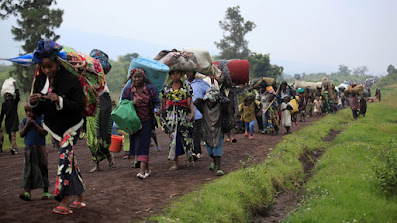This blood-soaked region is hurtling toward another war. The Eastern Congo's minerals, ethnic rivalries and armed groups ensure instability.
It began with the Rwandan genocide, in 1994, when over a million people of the Hutu ethnic group fled Rwanda for Congo, then called Zaire. Among the Hutus were many who had been responsible for killing millions of Tutsis.
It was once labeled Africa's World War, a transnational conflict that cost millions of lives. At best, over the past decades, there has been a fragile peace. But there has never been a definitive end to the conflict in the east of Democratic Republic of Congo.
NOW, tension between Congo [formerly known as Zaire] and its neighbor, Rwanda, could lead to war in Africa's Great Lake region. However, like other crises in Africa - famine, drought, coups and interethnic violence - it has received little international attention.
The presidents of Congo and Rwanda were scheduled to meet on Wednesday in Angola to discuss a situation that has been escalating for weeks.
Congo has accused Rwanda of backing the rebel group M23, which has killed civilians in a series of attacks, captured a cross-border trading town, caused more than 25,000 people to flee and may have shot down a United Nations helicopter, killing eight peacekeepers on board, according to a recent U.N. report.
Rwanda had denied supporting the rebels, but relations between the two countries have been strained.One Congolese official declared that if Rwanda ''wants war, it will have war.''
President Felix Tshisekedi of Congo last month suspended bilateral agreements with Rwanda and accused the country of wanting to occupy Congo's land to profit from its vast mineral wealth.
''Eastern Congolese civilians are innocent under brutal attack from our neighbor,'' he said.
Rwanda, in turn, has accused Congo of attacking its border. In May, Rwanda's Ministry of Defense said two of its soldiers on patrol were kidnapped by rebels, and later announced their return following a diplomatic intervention.
Eastern Congo is home to more than 16 million of the country's estimated 90 million people. Most of the inhabitants are farmers, living in villages scattered across the countryside and growing their own food - when it's safe to do so.
These people have been buffeted by decades of war : Millions have been killed, raped or driven from their homes by violent attacks over the years. When these attacks happen, there is no reliable police force or functioning courts to hold perpetrators to account.
People sometimes seek refuge in the region's cities, but these are not exactly safe. Periodically, a volcano explodes over Goma, a commercial hub.
The last time this happened, in June last year, 5,000 homes were destroyed. And in 2012, the city was seized by rebel fighters from the M23 - the militia at the root of the latest tensions between Congo and Rwanda.
The Publishing continues. The World Students Society thanks authors Ruth Maclean and Abdi Latif Dahir.

.png)


0 comments:
Post a Comment
Grace A Comment!